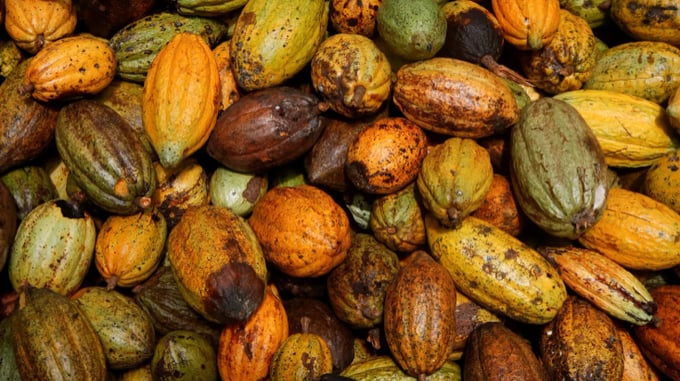December 1, 2025 | 11:11 GMT +7
December 1, 2025 | 11:11 GMT +7
Hotline: 0913.378.918
December 1, 2025 | 11:11 GMT +7
Hotline: 0913.378.918

Cocoa pods are pictured at a farm in Sinfra, Ivory Coast April 29, 2023.
Ivory Coast, the world’s top producer of the main ingredient in chocolate, is in the dry season that runs from mid-November to March when rains are scarce.
Farmers had been worried that the hot weather would delay the start of the mid-crop season and tighten bean supply before the country’s central regions received above-average rains last week.
Farmers said they were now happy because the moisture was expected to help young pods to survive. They added that another rain was needed before the end of the month to improve the yield of cocoa trees.
“Trees will do better. Many cocoa trees had become weak due to lack of water,” said Etienne Brou, who farms near the central region of Yamoussoukro, where 18.2 millimetres (mm) of rain felllast week, 11.3 mm above the five-year average.
Similar comments were made in the central region of Bongouanou, where rainfall was above average, and in the west-central region of Daloa, where rains were below average but farmers said the moisture level was sufficient to help cocoa trees.
Farmers from the western region of Soubre and the southern region of Divo, where rains were below average, and farmers from the southern region of Agboville and the eastern region of Abengourou, where rains were above average, said growing conditions remained good with plenty of cherelles turning into small pods.
Farmers in those regions added that if rains became regular from March, the mid-crop would be as abundant as last season.
“If we have good rains from March onwards, we’ll have enough beans for the mid-crop,” said Kouassi Kouame, who farms near Soubre, where 1.2 mm of rain fell last week, 7.2 mm below the average.
The weekly average temperature across Ivory Coast last week ranged from 27.8 to 33.2 degrees Celsius.
CNBC

(VAN) The signing of a protocol between Viet Nam and China on the export of fresh jackfruit represents a significant milestone in agricultural trade cooperation between the two countries.

(VAN) On November 27, the Ninh Binh Department of Agriculture and Environment and the Institute for Green Growth Research organized a training course on greenhouse gas inventory for businesses.

(VAN) China’s cooking oil is suddenly flooding into India. It all comes down to a soybean surplus that Beijing doesn’t quite know what to do with.

(VAN) An Giang promotes supply-demand connections, standardizes quality and builds value chains, creating a foundation for sustainable bird’s nest development and aiming to expand exports.
/2025/11/24/5339-4-nongnghiep-075331.jpg)
(VAN) Recently, the conference on 'Sustainable Fisheries Linkage Chain - Tilapia for Export' took place in Tien Hai commune, Hung Yen province.
/2025/11/21/4309-2-153400_128.jpg)
(VAN) Green and low-emission rice is paving the way for Vietnamese rice to enter high-end markets, marking the beginning of a transformation journey toward greening and elevating the national rice brand.

(VAN) ‘Right to Win’ outlines a national action plan that shapes a new vision for Viet Nam’s agriculture in an era of renewal and global integration.